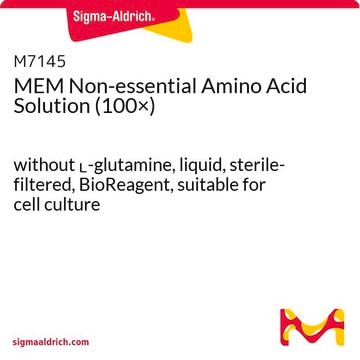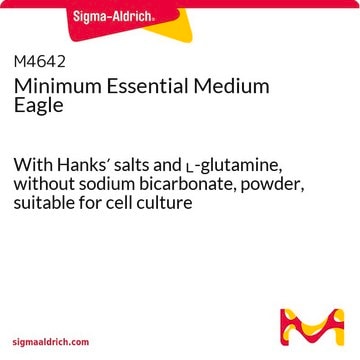M0643
Minimum Essential Medium Eagle
With Earle′s salts, L-glutamine, and non-essential amino acids, without sodium bicarbonate, powder, suitable for cell culture
Synonym(s):
EMEM, MEM
Sign Into View Organizational & Contract Pricing
All Photos(1)
About This Item
UNSPSC Code:
12352207
NACRES:
NA.75
Recommended Products
Quality Level
form
powder
technique(s)
cell culture | mammalian: suitable
components
HEPES: no
Earle’s salts (5% CO2): yes
NaHCO3: no
phenol red: yes
L-glutamine: yes
sodium pyruvate: no
shipped in
ambient
storage temp.
2-8°C
Looking for similar products? Visit Product Comparison Guide
General description
It contains 19 amino acids. The essential amino acids and the non-essential amino acids; L-ala; L-asn; L-asp; L-glu; L-gly; L-pro and L-ser. May be preferred for growth of adherent cells in the presence of reduced serum or as a base for development of a serum free medium.
Minimum Essential Medium Eagle consists of inorganic salts, water-soluble vitamins, sugar, and essential amino acids. It is widely used as a media formulation for many cell culture studies. It is a modified version of Basal medium Eagle (BME) and the concentrations of the majority of amino acids are twice as compared to BME.
Application
Minimum Essential Medium Eagle has been used to culture osteoblast-like cell line MG-63, dispersed ventricular cells, and endometrial adenocarcinoma Ishikawa cells.
Quantity
Formulated to contain 9.6 grams of powder per liter of medium.
Reconstitution
Supplement with 2.2 g/L sodium bicarbonate.
also commonly purchased with this product
Product No.
Description
Pricing
Storage Class Code
11 - Combustible Solids
WGK
WGK 2
Flash Point(F)
Not applicable
Flash Point(C)
Not applicable
Certificates of Analysis (COA)
Search for Certificates of Analysis (COA) by entering the products Lot/Batch Number. Lot and Batch Numbers can be found on a product’s label following the words ‘Lot’ or ‘Batch’.
Already Own This Product?
Find documentation for the products that you have recently purchased in the Document Library.
Customers Also Viewed
Tatsuma Yao et al.
Reproductive medicine and biology, 16(2), 99-117 (2017-12-21)
Cell culture technology has spread prolifically within a century, a variety of culture media has been designed. This review goes through the history, characteristics and current issues of animal-cell culture media. A literature search was performed on PubMed and Google
János Magyar et al.
European journal of pharmacology, 487(1-3), 29-36 (2004-03-23)
Concentration-dependent (10-1000 microM) effects of terpenoid phenol derivatives were studied on L-type Ca(2+) current in isolated canine and human ventricular cardiomyocytes using the whole-cell configuration of patch clamp technique. Carvacrol, thymol and eugenol suppressed peak Ca(2+) current at +5 mV
Atomic layer deposited TiO2 films on an equiatomic NiTi shape memory alloy for biomedical applications
Abbas A, et al.
Journal of alloys and compounds, 161282-161282 (2021)
Sarah M Davis et al.
Molecular therapy. Nucleic acids, 21, 266-277 (2020-07-02)
Small interfering RNAs (siRNAs) have the potential to treat a broad range of diseases. siRNAs need to be extensively chemically modified to improve their bioavailability, safety, and stability in vivo. However, chemical modifications variably impact target silencing for different siRNA sequences
Is it time to reinvent basic cell culture medium?
Turney J McKee et al.
American journal of physiology. Cell physiology, 312(5), C624-C626 (2017-02-24)
Our team of scientists has experience in all areas of research including Life Science, Material Science, Chemical Synthesis, Chromatography, Analytical and many others.
Contact Technical Service






